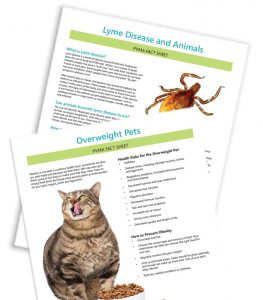Are you a pet owner looking for resources about the COVID-19 pandemic?

Pet Owners
COVID-19 Resources
Preventive Pet Care
Preventive care, or a general wellness visit, is a proactive approach to healthcare. Just like changing the oil in your car can prevent additional problems, regular check-ups with your veterinarian for your pet can catch problems early or prevent them altogether. Depending on the age and health of your pet, your veterinarian may even create a customized plan of preventive care that is tailored to your pet’s specific needs.
Regular check-ups are also important because your pet can’t tell you when it doesn’t feel well. Unlike humans, animals hide pain, so there may not be any outward signs that something is wrong. Regular check-ups allow you to be sure that your pet is in good health.
The Importance of Preventive Care
Many dogs and cats in the United States do not get the regular preventive care check-ups they need to stay healthy. Pets should receive a veterinary examination at least annually and – for some animals – more frequent visits may be appropriate.
What Is Preventive Care About?
Preventive care, or a general wellness visit, is a proactive approach to healthcare. Just like changing the oil in your car can prevent additional problems, regular check-ups with your veterinarian for your pet can catch problems early or prevent them altogether. Depending on the age and health of your pet, your veterinarian may even create a customized plan of preventive care which is tailored to your pet’s specific needs.
AAHA/AVMA Feline Preventive Healthcare Guidelines
All cats should have a veterinary examination at least annually. For many cats, more frequent visits may be appropriate. Decisions regarding specific frequency of visits should be made based on individual needs of the cat.
Pet Health Fact Sheets

PVMA’s Fact Sheets are designed with the public in mind. Each one highlights the importance of veterinary medicine and provides tips and facts on a variety of important topics.
Click on any of the Fact Sheets to print or download and save for use later. We plan to expand our selection of Fact Sheets, so if there is a topic you would like to see covered, let us know!
Pet Health
- Anti-Tethering/Chaining Resource Sheet
- Canine Influenza
- Pet Dental Health
- Overweight and Obesity in Pets
- Rabies Backgrounder
- Pet First Aid
- Preventive Care
- Lilies Are Toxic to Cats
- Poisonous Plants
- Lyme Disease and Animals
- West Nile Virus
- Reporting Animal Cruelty
- Pets and Diabetes
- Senior Pets
Holidays & Weather
- Valentine’s Day Safety Tips
- Summer Holiday Safety Tips
- Winter Holiday Safety Tips
- Motor Vehicle Extreme Heat Protection Act
- Hot Weather Tips
- Pets in Hot Cars Infographic – SOURCE: Fred Beans Kia in Mechanicsburg
- Cold Weather Tips
General Information
Helpful Links
American Veterinary Medical Association (AVMA)
The AVMA’s extensive website has a large section of Public Resources that can help you with everything from pet care to handling emergencies to careers in veterinary medicine. They also have some great tips for preventing dog bites.
Choosing a Veterinarian
Click here for information from the AVMA on what to think about before choosing a veterinarian to make sure that you make a choice that works for your individual needs.
National Pesticide Information Center
Find answers to questions about how pesticides can affect your family and your pets. Visit their website or call 800.858.7378.
Pet Poison Helpline
Did your dog or cat just eat something poisonous? Call your veterinarian or Pet Poison Helpline immediately. The sooner a dog poisoning or cat poisoning is diagnosed, the easier, less expensive, and safer it is to treat your pet. Call 855.764.7661 or visit their website.
PA Dog Licenses
All dogs three months or older must be licensed by January 1 of each year. Violators can be cited with a maximum fine of $300 per violation plus court costs. If your dog gets lost, a current license is the fastest way to get him back. The small license fee helps the millions of dogs in the state by funding the Pennsylvania Department of Agriculture Bureau of Dog Law Enforcement. Purchase a license from your county treasurer or issuing agent. For more information, visit LicenseYourDogPA.com.
Dog Bite Prevention Resources
Click here to read about dog bite prevention for kids, as well as access some great links leading to dog bite prevention coloring books, games, and a quiz. There are also printable information sheets that teach about how to read a dog’s body language, tips, and more.


